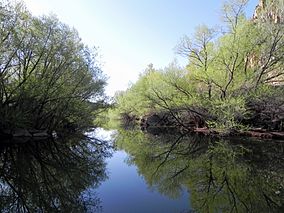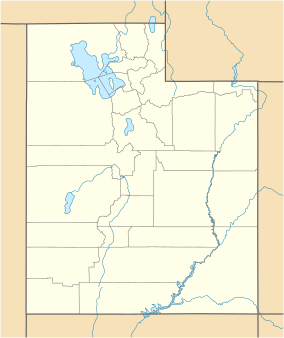Quail Creek State Park facts for kids
Quick facts for kids Quail Creek State Park |
|
|---|---|
|
IUCN Category V (Protected Landscape/Seascape)
|
|

Upper end of Quail Creek Reservoir
|
|
| Location | Washington, Utah, United States |
| Elevation | 3,300 ft (1,000 m) |
| Established | 1986 |
| Visitors | 283,321 (in 2022) |
| Operator | Utah State Parks |
Quail Creek State Park is a fun state park in Utah, United States. It has a big lake that's about 600 acres (240 hectares) in size. The park is located near Hurricane, Utah. It's about 9 miles (14 km) west of the city center. It's also 1.5 miles (2.4 km) south of the old ghost town of Harrisburg.
Quail Creek State Park is a great place for outdoor activities. You can go camping, boating, swimming, and fishing here. The lake is quite deep, reaching up to 120 feet (37 meters) in some spots. The deeper parts are cold enough for fish like rainbow trout, bullhead catfish, and crappie. In the warmer, upper parts of the lake, you can find largemouth bass and bluegill. All these fish are put into the lake by wildlife officials.
Contents
History of Quail Creek State Park
The Quail Creek lake was finished in 1985. It was built to provide water for farms and drinking water for the St. George area. Most of the water in the lake doesn't come from Quail Creek itself. Instead, it's brought from the Virgin River through a hidden pipeline.
Building the Dams
Two dams were built to create the reservoir. The main dam is an earthfill dam. This means it's made mostly of dirt and rocks packed together. The south dam is a special type of concrete dam. It's called a roller-compacted concrete dam. This dam was built to replace an older earthfill dam. The first south dam had a problem and failed on New Year's Day in 1989.
Why is it Called Quail Creek?
The area was named Quail Creek because many quail used to live there. These birds were common along the upper parts of the creek in the 1800s and early 1900s. Sadly, a very harsh winter caused the quail population to disappear.
Some people might think the park is named after someone called Anthony Quayle. However, his name is spelled differently. He also has no historical connection to this area. The name truly comes from the birds that once lived there.
Understanding the Name on Maps
You might see the name Quail Creek in the wrong place on some maps today. The true location of Quail Creek was officially described a long time ago. This was in a legal document called the Quail Creek Decree. It was decided by a court in Washington County, Utah, on March 5, 1923. This document explains where the water from Quail Creek goes.
What the Decree Says
The Quail Creek Decree describes the creek as a "natural stream of water." It says the creek and all its smaller streams are in Washington County, Utah. It also states that the creek starts in the Pine Valley Mountains. Then it flows southeast until it meets the Virgin River.
The document also mentions that Quail Creek is a "fluctuating stream." This means its water level changes. It also says that all the water from the creek is good enough to be used. People use it for drinking, cooking, and other purposes.
The Real Quail Creek
The real Quail Creek gets its water from many small streams. These streams flow from the southern side of Pine Valley Mountain. This creek provides water for farms and homes in the area. This is just as the Quail Creek Decree describes.
Some current maps incorrectly label this creek as "Leeds Creek." However, the name Quail Creek was used long before the name Leeds was available. The name Leeds Creek was given by settlers in the 1800s. They used it for a man-made ditch. This ditch brought water from Quail Creek to their farms and community.
Map Errors
The canyon that is mistakenly called Quail Creek on recent maps is small and dry. It has no smaller streams flowing into it. This location does not match the description in the Quail Creek Decree. This mistake is likely a clerical error. It's important to have the correct names. This helps us understand the history and water rights of this area.
You can find the Quail Creek Decree and related documents online. Just search for the name on the Utah Division of Water Rights website.
 | Jackie Robinson |
 | Jack Johnson |
 | Althea Gibson |
 | Arthur Ashe |
 | Muhammad Ali |



